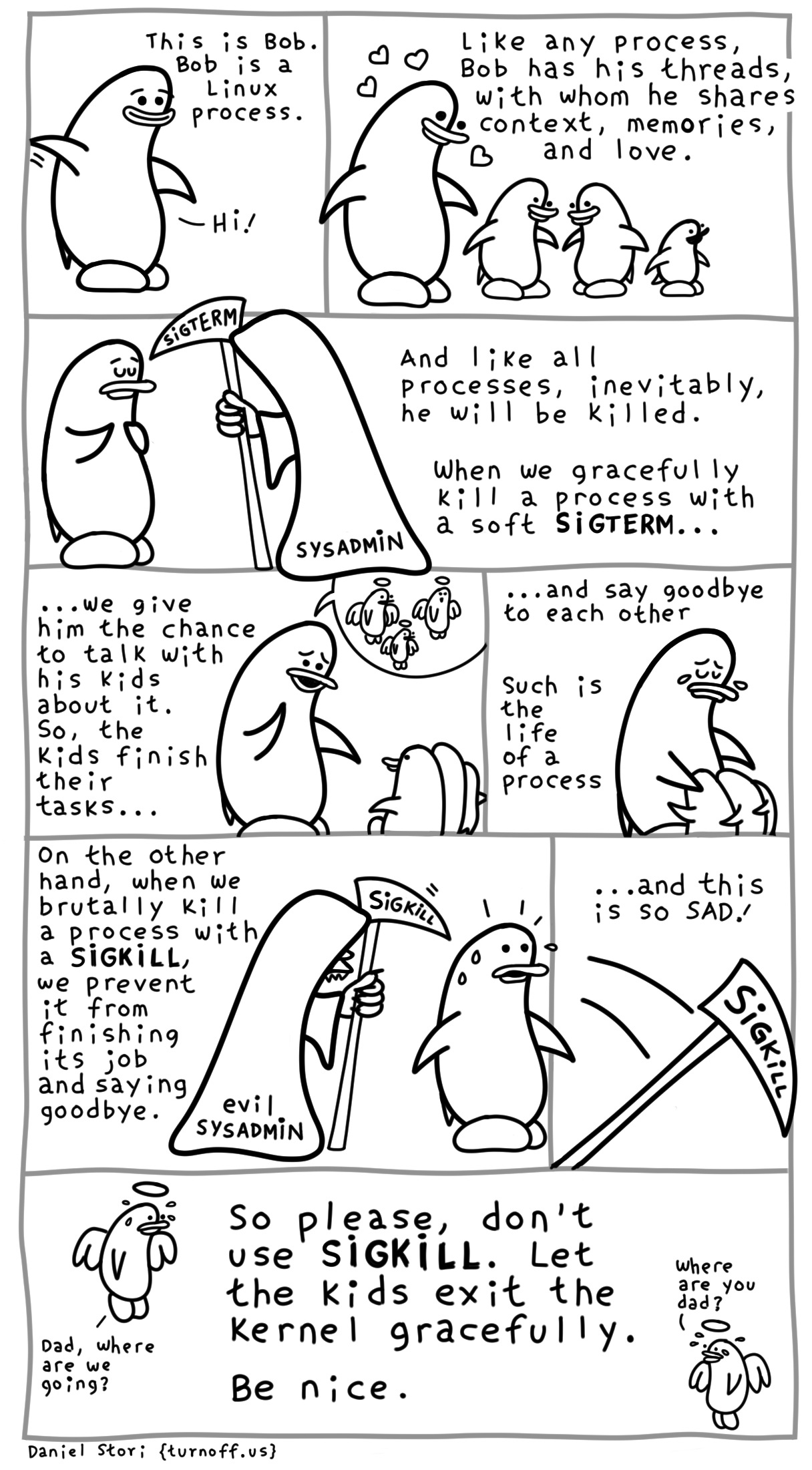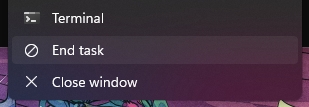And as always with this meme: Both Windows and Linux can ask a process nicely to terminate or kill it outright. And the default for both is to ask nicely.
linuxmemes
Hint: :q!
Sister communities:
Community rules (click to expand)
1. Follow the site-wide rules
- Instance-wide TOS: https://legal.lemmy.world/tos/
- Lemmy code of conduct: https://join-lemmy.org/docs/code_of_conduct.html
2. Be civil
- Understand the difference between a joke and an insult.
- Do not harrass or attack users for any reason. This includes using blanket terms, like "every user of thing".
- Don't get baited into back-and-forth insults. We are not animals.
- Leave remarks of "peasantry" to the PCMR community. If you dislike an OS/service/application, attack the thing you dislike, not the individuals who use it. Some people may not have a choice.
- Bigotry will not be tolerated.
- These rules are somewhat loosened when the subject is a public figure. Still, do not attack their person or incite harrassment.
3. Post Linux-related content
- Including Unix and BSD.
- Non-Linux content is acceptable as long as it makes a reference to Linux. For example, the poorly made mockery of
sudoin Windows. - No porn. Even if you watch it on a Linux machine.
4. No recent reposts
- Everybody uses Arch btw, can't quit Vim, <loves/tolerates/hates> systemd, and wants to interject for a moment. You can stop now.
5. 🇬🇧 Language/язык/Sprache
- This is primarily an English-speaking community. 🇬🇧🇦🇺🇺🇸
- Comments written in other languages are allowed.
- The substance of a post should be comprehensible for people who only speak English.
- Titles and post bodies written in other languages will be allowed, but only as long as the above rule is observed.
Please report posts and comments that break these rules!
Important: never execute code or follow advice that you don't understand or can't verify, especially here. The word of the day is credibility. This is a meme community -- even the most helpful comments might just be shitposts that can damage your system. Be aware, be smart, don't remove France.
Next, you'll tell me I shouldn't get all my news from memes!
Well, with linux you get the option of sending mixed signals through the use of varying count of guns. I find 9 to be highly effective.
on windows a process can get in a state so that it is impossible to make it go away, even with process explorer or process hacker. mostly this also involves the bugged software becoming unusable.
I encounter such a situation from time to time. one way it could happen is if the USB controller has got in an invalid state, which one of my pendrives can semi-reliably reproduce. when that happens, any process attempting to deal with that device or its FS, even the built-in program to remove the drive letter, will stop working and hang as an unkillable process.
Linux has that issue too. A process in an uninterruptible blocking syscall stays until that syscall finishes, which can be never if something weird's going on.
I've seen that on Linux as well. Funnily enough also with faulty file systems. I think NFS with spotty wifi for one.
Oh, and once with a dying RAID controller. That was a pain in the ass. At that point I swore to only ever do RAID in software.
Because that's better for the software, Linux however kills it outright when it doesn't respond at all. Windows just... Waits. And you can't really hardkill the processes from the task manager. Or at last my last knowledge is that.
League of Legends captures and discards the ALT-F4 keystroke combination.
Microsoft trusts app developers to use Microsoft's standards (such as terminating the process when a close message is received) and they shouldn't. App developers like Riot have taken advantage of this trust and tuned their apps to act differently than expected, and include code which makes the app minimize to the system tray instead, or force the user to answer questions ("Are you SURE you want to close?"), or do nothing at all.
It should be punishable by death.
Linux programs can also capture signal calls. They usually only capture sigints so that they can close gracefully, but theoretically you could also capture a sigkill.
You can easily make a program unkillable (or to be more precise untermable) on Linux. Here's a simple bash script that will do that.
#!/bin/bash function finish {
while true
do
echo "Can't kill me."
sleep 10
done
} trap finish EXIT
trap finish TERM
trap finish INT
while true
do
echo "Still alive."
sleep 10
done
Windows can kill a process outright.
Hmmmm...
Taskkill /f is reasonably close to sudo kill -9
Hitting the X in Windows and hitting the X in Linux both cause the application to start a save yourself routine. From the OS standpoint they're not far off.
The problem is we have a lot of confirmation bias in windows because every time we want to close an application that's not working, that save yourself call has to sit around for a hellaciously long time out followed by a telemetry call so that Microsoft can track that it happened.
It's pretty rare that Linux apps don't just close.
Sigterm: "End this process or next time I bring my -9"
My tec-9
Actually no, it's just that the programs on Linux usually accept SIGINT, SIGTERM, etc pretty gracefully. Some are even smart enough to handle it on a thread hang. SIGKILL is last resort.
Lots of Windows applications like to ignore the close request because Windows doesn't have signals and instead you can only pass a window name to request exit which is the same as clicking the close button.
So any hung software won't respond and you have to terminate it.
My problem with Windows is that when I want to eject a USB drive, Windows refuses to do so, refuses to tell me what program is apparently still using the drive, and certainly refuses to kill that program. I am removing the drive. I can't just not remove it!
I've found that in those cases its usually explorer that's the culprit. Just having the removable drive open in explorer is enough to keep windows from being able to unmount the drive.
This is entirely wrong
“Userid 1000 will shut down in 2 minutes”
Or whatever it says
I haven't seen that in a while. When you see that it means either that the service didn't handle the terminate signal correctly or that is is busy doing something. (Sometimes both)
Typing “kill -9” into a terminal is the equivalent to breaking out the acetylene torch when a nut won’t budge
Can't be tight if it's liquid
you forgot that you have to spend about 2 minutes with windows "searching for a solution" (who knows what that does??) and then another minute reporting it to microsoft
Unless it is nfs unmount on down server. Or failed disk...
Bigger fish to fry at that point bub
How the OOM Killer asks a process to terminate:
indiscriminate spraying
both OS ask a process to end nicely? Then force closing in windows is with task manager or kill -9 in linux
mainly wrong, by default kill send a SIGTERM, you can try SIGINT or SIGQUIT too, and in the end SIGKILL of course. Same in windows there is different way
I always go straight for the SIGKILL

Every time you SIGKILL, a poorly-drawn penguin dies!
Some software: fork()
Me: Welcome to the process gauntlet loser, better not hang for a millisecond or you are dead and gone.
TerminateProcess() is pretty reliable, but it doesn't form part of the C signals stack on Windows like kill -9. So for instance, if you're doing process control on Python, you need to use a special Windows-only API to access TerminateProcess().
Is there some Linux equivalent to "ctrl + alt + del?" I get that killing a process from the terminal is preferred, but one of the few things I like about windows is if the GUI freezes up, I can pretty much always kill the process by pressing ctrl+alt+del and finding it in task manager. Using Linux if I don't already have the terminal open there are plenty of times I'm just force restarting the computer because I don't know what else to do.
Ctrl+alt+F1/F2/F3 etc.
It lets you switch to another terminal session, where you can use something like top/htop for a commandline equivalent to task manager.
That's what I don't get about what they said above. If the Windows desktop freezes up, Task Manager won't open either (happened to me quite some times over the years - less so since they moved to the NT kernel though). What you mentioned always works short of kernel panic.
Try ctrl+shift+ESC And remember, there are customizable hotkeys, just explore the settings
I feel like I've had the opposite experience in the gui (maybe a KDE issue?) closing gui windows frequently lock up, and I find I frequently have to drop to the command line in order to properly kill some programs
 Enters the chat
Enters the chat
